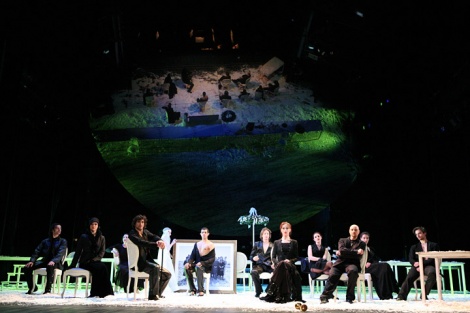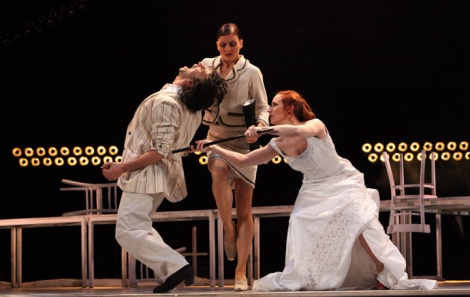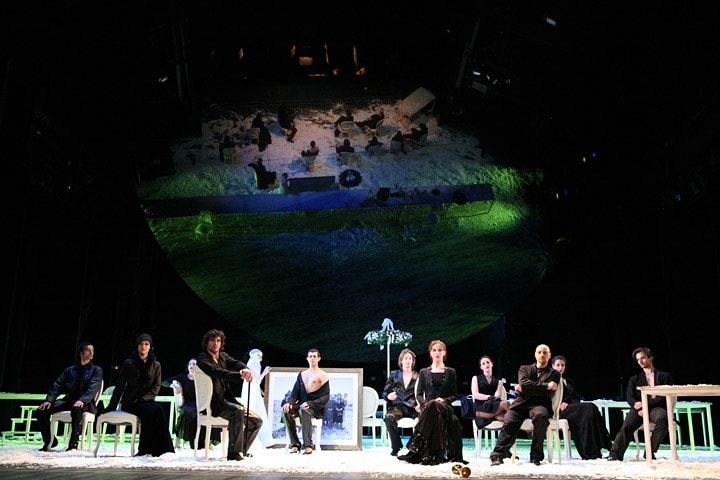Winterreise is one of the best concerts you will ever attend. A splendid evening of Schubert music. Choreographer Jochen Ulrich worked hand in hand with composer Heinz Winbeck to develop a full length score of the best of Schubert’s music for orchester and a singer.
The singer Martin Achrainer fills each song full of portent and passion. Fans of German lieder would swoon. I hope there’s a compact disc for sale. In his dramatic performance, Achrainer often takes the role of the composer Schubert himself, writing out sheafs and sheafs of music on stage in the first act.
The stage is dramatically decked out with a huge round mirror overhead, about 15 metres across, which can flutter in moments of dramatic importance offering a strange through the looking glass feel. At the front corner of the stage there is an impressionist painting of Schubert’s time. Alas, the painting at 1.5 metres wide is too small to be intelligible and too large not to notice. Most of the lighting is strongly green tinted for some reason. Alas for most of the piece, the lights are also just too bright. I’m no fan of watching dance in the dark, but until the last half hour of the two hour performance, one felt that one was under rehearsal lights and the light technicians went off duty while the choreographer and dancers worked.

Jochen Ulrich Winterreise ensemble
With such bright lights, the large atmospheric candelabra arrangements on stage had little effect.
In spite of the interrogation lights, the dramatic development is extremely difficult to follow. In the beginning there is a stream of beautiful women wandering on stage only to be accosted by pairs of men and disappear. Later when the women reappear on stage they are inebriated and stumbling. Now they are out and out ravished by packs of four and five men. Looking into the program one learns that there’s a bride (Clara Pascual Martí) and her mother (Irene Bauer). Bauer changes costume more than anyone else in the production, strutting gorgeously in high heels and a tight tiny white skirt in her first appearance and with a long spell in the second act in a long black evening gown, an elegant precursor to the flappers. I’ve rarely seen someone dance so well in high heels but as the mother, Bauer is sadly often left to just wander around.

Fabrice Jucquois Irene Bauer Clara Pascual Marti
The cast list continues with a father (Fabrice Jucquois), a sister (Anna Sterbová), a brother in law (Wallace Jones) and an uncle (Daniel Morales Pérez). On the other side we have a groom (Matej Pajgert), his mother (Sarah Deltenre), his father (Alexander Novikov), his brother (Emilijus Miliauskas), his female cousin (Lucia Patoprstá) and his sister-in-law (Marietta Kro). Who all of these people are we really have no idea. They spend a lot of time kissing one another and pulling up the women’s skirts. Kro is particularly winsome in her long dress with her attentive lover Daniel Morales Pérez. Wallace Jones impresses with his tender attentions to his partners male and female in his appearances. Jucquois convinces as a sufficiently dominant patriarchal presence.
Schubert’s personal life was difficult, he often lived abroad. Towards the end of his life he suffered from severe illness and near blindness. But there is no direct equivalent in the Ulrich’s libretto. Ulrich’s starting point was of course Schubert’s music and curiously wedding scenes from the films of Fellini and Kusterica.
Fellini’s mad weddings are difficult enough to comprehend on film. In the theater, one doesn’t have the same chance to change viewpoint or perspictive, unless its via selective light of which we saw little. I’m not quite sure how an early death to syphilis at 31 (Schubert’s fate) is equivalent to incest and rape among the gypsies.
Still the lyrics of the Winterreise songs (the words were not written by Schubert but rather by a poet he admired, Wilhelm Müller or for some of the songs by composer Heinz Winbeck) do support Ulrich’s dark vision:
Heart be still Why do you hammer relentless It's the will of the heavens That I must leave you now.
Of course, with dancers as luscious as Bauer, Kro and Patoprstá one doesn’t always need a linear libretto. The men don’t look too bad stripped to the waist and in black trousers either. Whatever the story, there is far too much walking and too much pantomime. Why they wander and wander in circles is a mystery to me. I can understand that Ulrich wants to experiment with gait, but that doesn’t seem to be his intention. It’s as if we are watching an early walk through where the steps haven’t all been set and the dancers are just finding their places.
Nearly all of these episodes could be energetically danced and bridged with dance. Grigorovich told stories through dance in his ballets, particularly Romeo and Juliet, I don’t know why Ulrich doesn’t want to take the final step and insist the movement tell his story.
No matter how fed up one gets with strutting dancers and the incoherently episodic story, one can always return in the end to Achrainer’s singing.
Besides Achrainer’s fine singing, the musical side had solid support from a good orchestra performance under conductor Takeshi Moriuchi’s energetic leadership. Maaki Namekawa’s solid piano solos.
The final half-hour picks up when the lights go down and something approaching a marriage and the family photo afterwards slowly devolves to surrealistic spinning of the stage while a figure in red silk lies crucified. At one point the feathers are thrown up in the air over the group as dancers pose in the middle giving us the effect of one of those glass snow scenes shaken up as the snow floats down. Later Achrainer plays with a wooden rocking horse in the foreground with dark glasses, slowly going blind and losing his mind.
One wonders why Ulrich waited for the last half hour to do something with the lights and to really work his story.
In the end, no harm is done. For the languid stretches, one can close one’s eyes and just listen to Schubert’s astonishing songs beautifully renderd by both orchestra and singer. Yet if it weren’t for the wonderful music, Winterreise might be judged confusing and over long.
In spite of it all, there is great pleasure in Winterreise. At least Ulrich’s dancers are doing something and there’s great music to hear. Dance life can be much worse: one could be stuck in the Vienna contemporary dance scene, watching dancers sulk in the corner in dirty jogging suits, picking at scabs on their arms. Go to Landestheater Linz instead.
While you’re at Landestheater Li, don’t miss the Promenadenhof next door. There’s a fabulous garden and the traditional Austrian pastries are top-notch.
Having seen Winterreise here in Linz, I’m very curious about the Hamburg Ballet’s version by John Neueimeier from 2001.
For more information about Jochen Ulrich’s Winterreise, including performance dates, photographs and tickets, visit the Landestheater Linz website.

